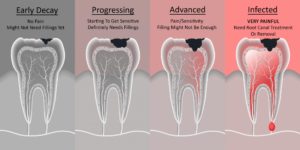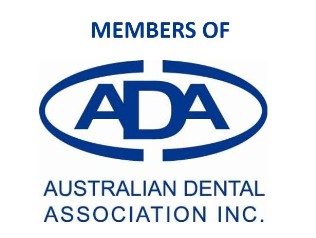Tooth Decay – should you get it fixed?
A recent study conducted by the Australian Institute of Health and Welfare, found that 3 in 10 adults aged 25-44 had untreated tooth decay.
So is this really important? Does it really matter?
In order to answer these questions, I’d like to explain a bit about tooth decay first.
What is tooth decay?
Tooth decay is the breakdown of the structure of a tooth. It is also commonly known as a ‘cavity’, hole, or dental caries.
How does it happen?
Tooth decays occurs when bacteria build up in the mouth produces acids which cause the tooth structure to breakdown.
How is it detected?
- Visually due to a noticeable colour difference in the tooth structure
- By using an instrument to ‘feel’ the inside of the tooth structure
- On an x-ray
- If the tooth is obviously broken or fractured because it has become weakened from the tooth decay
So, why does tooth decay matter?
Tooth decay is a serious dental disease because the side effects from lack of treatment can ultimately result in the loss of the tooth. In other words, if left untreated, the tooth could eventually need to be extracted.

Worst case scenario possibilities of untreated tooth decay are:
- The tooth breaks of fractures causing discomfort when eating
- Sensitivity to hot and cold food/drinks
- Pain when eating
- Toothache
- Infection causing swelling in the gum or face, which could be life-threatening
- Discolouration of the tooth/teeth which could be unaesthetic
- You might need a root canal treatment
- You might need the tooth removed if it can’t be saved
Tooth decay is just the start of a lot of problems! The sooner the decay is cleaned out and filled, the better the prognosis for the tooth long-term. The smaller the area of decay, the higher the chance it can be fixed successfully with a filling.
If tooth decay is left for too long, it eventually progresses further into the tooth. Once the decay gets to the nerve (which for some people doesn’t take long at all!), that is when a toothache and infection can start.
DISCLAIMER: Tooth decay does not always present with symptoms. Just because you do not have any pain or sensitivity does not mean you may not have tooth decay! Early stages of tooth decay do not cause pain. But if left too long, pain is an inevitable side effect.
As always, prevention is better than cure! If you think you have tooth decay, please call us now on 6143 5655 or book online to have it checked out as soon as possible!






